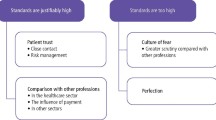Abstract
Introduction This study focuses on how the legal and ethical requirements presented by the General Dental Council (GDC) in their Standards for the dental team (2013) document are perceived by newly qualified dentists; that is, those who have been qualified for less than five years.
Aim The aim of the study was to investigate how the GDC guidance and the set standards for the dental team are perceived and understood by newly qualified dental practitioners, and how the guidance and the standards influence clinicians' decision-making. The study explored the newly qualified dentists' exposure to law and ethics, the GDC and their regulatory document, together with the clinical and non-clinical influence of this regulation on daily practice.
Methods Empirical qualitative data were collected using semi-structured interviews of nine newly qualified dentists, with an average of 80 minutes for each interview. The data were analysed using thematic analysis.
Results Three main themes were identified through the newly qualified dentists' perceptions of the GDC selected standards. These included sense of fear, morale and the business of dental practice, with further subthemes identified.
Conclusion Results from this study present an opportunity and a challenge, as there is some fear and uncertainty among newly qualified dentists about the application of some of the GDC standards in practice. Further training in law and ethics as well as additional support for newly qualified dental practitioners is needed.
Key points
-
Explores how the GDC standards are perceived among some newly qualified dentists.
-
Highlights some of the challenges facing newly qualified dentists in interpreting the GDC standards and how it may influence their practice.
-
Offers a reflection on some legal and ethical aspects related to the implementation of the GDC standards.
This is a preview of subscription content, access via your institution
Access options
Subscribe to this journal
Receive 24 print issues and online access
$259.00 per year
only $10.79 per issue
Buy this article
- Purchase on Springer Link
- Instant access to full article PDF
Prices may be subject to local taxes which are calculated during checkout
Similar content being viewed by others
References
UK Government. Dentists Act 1984. 1984. Available at https://www.legislation.gov.uk/ukpga/1984/24 (accessed April 2020).
Ward P. Who regulates the regulator? Br Dent J 2017; 222: 641.
Henderson S. The GDC under the microscope. FDJ 2016; 7: 98-102.
Holden A C L. Self-regulation in dentistry and the social contract. Br Dent J 2016; 221: 449-451.
Anonymous. Regulator seeks to tackle 'climate of fear' among new dentists. Br Dent J 2019; 226: 247.
General Dental Council. Standards for the Dental Team. 2013. Available at https://standards.gdc-uk.org/ (accessed April 2020).
Bertolami C. Why Our Ethics Curricula Don't Work. J Dent Educ 2004;68: 414-425.
Patrick A C. A review of teaching ethics in the dental curriculum: challenges and future developments. Eur J Dent Educ 2017;DOI: 10.1111/eje.12230.
Holden A. What do dental codes of ethics and conduct suggest about attitudes to raising concerns and self-regulation? Br Dent J 2018;224: 261-267.
Bowling A. Research Method in Health: Investigating Health and Health Services. 4th ed. Maidenhead: Open University Press, 2014.
Kuper A, Reeves S, Levinson W. An introduction to reading and appraising qualitative research. BMJ 2008; DOI: 10.1136/bmj.a288.
Westgarth D. Stress and Fitness to Practise cases: does one follow the other?2017. Available at https://bda.org/news-centre/blog/stress-and-fitness-to-practise-casesdoes-one-follow-the-other (accessed: March 2020).
Europe Economics. Risk in Dentistry: Report for the General Dental Council. 2014.Available at https://www.gdc-uk.org/docs/default-source/research/risk-in-dentistry.pdf?sfvrsn=e67dbf64_2 (accessed: February 2021).
Sekhar M, Vyas N. Defensive Medicine: A Bane to Healthcare. Ann Med Health Sci Res 2013; 3: 295-296.
Hauser M J, Commons M L, Bursztajn H J, Gutheil T G. Fear of Malpractice Liability and Its Role in Clinical Decision Making. 1991. Available at http://www.pipatl.org/bibliography/hauser/malpractice.html (accessed April 2020).
Al Hassan A. Defensive dentistry and the young dentist - this isn't what we signed up for. Br Dent J 2017;223: 757-758.
British Dental Association. Dentist's fear and clinical decision making. 2013. Available at https://bda.org/dentists/education/sgh/Documents/Dentist's%20fear%20and%20clinical%20decision%20making.pdf (accessed April 2020).
Blum I R, Lynch C D, Wilson N H F. Teaching of direct composite restoration repair in undergraduate dental schools in the United Kingdom and Ireland. Eur J Dent Educ 2012; DOI: 10.1111/j.1600-0579.2010.00674.x.
Hellyer P, Radford D. An evaluation of defensive dentistry: whither the profession? Br Dent J 2017;223: 885-888.
Sharot T. What Motivates Employees More: Rewards or Punishments? 2017. Available at https://hbr.org/2017/09/what-motivates-employees-more-rewards-or-punishments (accessed April 2020).
Hancocks S. Defensive Dentistry. Br Dent J 2014;217: 327.
Studdert D M, Mello M M, Sage W M et al. Defensive Medicine Among High-Risk Specialist Physicians in a Volatile Malpractice Environment. JAMA 2005; 293: 2609-2617.
British Dental Association. Response to Health Education England's Advancing Dental Care Project. 2018. Available at https://bda.org/dentists/policycampaigns/campaigns/Documents/Response-Advancing-Dental-Care-project-March2018.pdf (accessed April 2020).
British Dental Association. Is there a Well-being Gap among UK Dentists? Results from the 2014 Dentists' Well-being and Working Conditions surveys. 2015. Available at https://bda.org/dentists/policy-campaigns/research/workforcefinance/gp/Documents/Dentists%27%20well-being%20%20report.pdf (accessed April 2020).
British Dental Association. Half of NHS Young Dentists Heading for the Exit.2017. Available at https://bda.org/news-centre/press-releases/half-of-nhs-young-dentistsheading-for-the-exit (accessed July 2018).
Tahir M, Mason C, Hind V. Informed consent: optimism versus reality. Br Dent J 2002;193: 221-224.
NHS Digital. NHS Dental Statistics for England - 2016-17. 2017. Available online at https://digital.nhs.uk/data-and-information/publications/statistical/nhs-dental-statistics/nhs-dental-statistics-for-england-2016-17#key-facts (accessed April 2020).
General Dental Council. Moving upstream. 2019. Available at https://www.gdc-uk.org/about-us/our-organisation/our-corporate-strategy-and-business-plans/moving-upstream (accessed June 2020).
Author information
Authors and Affiliations
Corresponding author
Rights and permissions
About this article
Cite this article
Thakrar, B., Wassif, H. Exploring how newly qualified dentists perceive certain legal and ethical issues in view of the GDC standards. Br Dent J (2021). https://doi.org/10.1038/s41415-021-2715-7
Received:
Accepted:
Published:
DOI: https://doi.org/10.1038/s41415-021-2715-7



